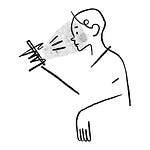We all KNOW we’re supposed to work out, but knowing that doesn’t make many of us do it. Seth and Tsh aren’t workout-obsessed, but as working parents in their early 40s who’d like to be around a good while, they’ve reaped the benefits of doing the hard work anyway. How do we find the motivation we need to keep moving, even when we don’t feel like it? Recognizing the sacramentality of our earthly bodies definitely helps.
Seth: Website | Newsletter | Twitter | Instagram
Tsh: Website | Newsletter | Twitter | Instagram
Some Kind of Peace, by Ólafur Arnalds
Explore all the shoes, bags, and masks available at Rothys.com/FRIEND.
Scroll down for the transcript.
Tsh: This is A Drink with a Friend, I’m Tsh Oxenreider.
Seth: And I’m Seth Haines.
On more days than not, I go through a round of weights at a gym, a CrossFit gym, it’s where I’m headed right now. Despite the reputation as being a meathead activity, it’s really not. My friend John Blase talked me into it and we’re going to talk to him in a little bit, why CrossFit?
It doesn’t have to be long, but what I wanted to hear from you was your journey with CrossFit and the coaching and why it’s important from a spiritual perspective, not necessarily even a Christian perspective but just a spiritual perspective.
John: I think it was Barry Lopez, actually who died just recently, years ago Seth, a long time ago. I read something where he said his life, he realized early on had to have a mental component to it but also a physical one and that’s how his life operated best. If he spent time reading or writing in the mornings or the afternoon he had to be chopping wood or laying brick or whatever the physical exercise was. I knew when I read that that I automatically knew that was true from me. I had that same experience even as a young man. More often than not that had founds it’s way to be true, me and exercise. I started out with c-net weight set from Sears that when you drop it, it cracks and you have this basically sand weight set after a couple of months. I continued that over the years, always a weightlifting element to it, but running and all over the map. When I turned 52, I was interested in CrossFit from a curiosity perspective because they were incorporating all these different disciplines— weightlifting, gymnastics, cardiovascular stuff—and for me, it seem to be a conversion of my interests at that time. I stepped into a box and immediately knew that that was it. But there was also this, it rang my bell personally, but there also very much a desire probably within the first three to four months to see if I could possibly be a coach in that environment because I saw the people around me experiencing body awareness. To some that might sound strange but I’m convinced about 80% of people have no sense of their body from where they are spatially. We talk about being in the present moment, it’s even connected to that. Where are you physically in this moment? Having the ability to be aware of your body, what your body not only is doing but like in CrossFit, can do with the proper coaching, proper technique. You start talking about things like efficiency, coupled with safety, coupled with power. I don’t understand all the physics of it, there are equations there that some of those guys use that are lost on me but there very much is a poetic physics element to it that’s actually very beautiful. I think that body awareness piece is really important for me. If I stay with it long enough that physical piece allows me to have some finger on the pulse of where I am emotionally which then transfers over to where I am mentally and all that to me is the spiritual life. Is that making any sense?
Seth: Yes. What you’re saying is to you, the spiritual life isn’t just some out there pie in the sky, spirit in the cloud experience. It’s everything. It’s body, heart, soul. It’s a combination of all of those things.
John: It is. For me, and I think we’ve talked about this before, if it’s not something that I can feel, as in maybe a 45-pound Olympic bar, then it’s not spiritual. There has to be that physical substance component to it. When you start talking about exercise, be it weighs, be it jump rope, even the way your feet strike the pavement if you’re running, that sensual element, that’s what it’s all about. Breaking the surface of the water if you’re diving, hugely sacramental.
Seth: Like the minute your hands split through the water, or the minute the back of your heel strikes the pavement, those sensorial moments.
John: Oh my gosh, yes. It’s probably not in ranking would be the same, but in the sensual realm, holding my first child, it’s that same kind of, you know where you are in that moment. You’re aware of what you’re holding, what you’re looking at, and what follows from that is what you’re feeling and what you’re thinking. I’ve actually had moments in the CrossFit box where I’ve been moved to tears, man. Not out of pain necessarily but even really discovering some of the things that the human body can do. I know in any conversation like that you have to be careful with [inaudible] language because everybody can’t do CrossFit, there are different kinds of limitations that some people have but most everybody can do something to move. That movement is so key. We’ve got several athletes here who are soldiers, amputees and stuff like that and they are moving, if those individuals can do that, then you don’t really have an excuse that you can’t do that. It’s so key to who I am spiritually. If that went away, that would be a very big challenge for me in terms of my spiritual life and trying to tune in to what’s going on.
Seth: That’s good. Thanks for sharing that and thank you for really kicking my butt into my first box because you’re the reason why I’m doing CrossFit, pretty much. It’s been good. I’ve found the same thing. The body awareness, the layers of body awareness have opened up layers of spiritual awareness and emotional awareness that I didn’t know that I needed.
John: It’s super important. Like I said, I think everybody can do something. My mom lapping the house, the rooms in the house to walk, there has to be something there. That’s it man.
Seth: That’s perfect.
Tsh: What are you drinking?
Seth: We’re talking about working out today and doing good things for the body, so I am drinking unadulterated water.
Tsh: [laugh]
Seth: The good stuff. The stuff that falls from the sky except for then it’s collected in huge tanks and chlorinated and run through pipes and goes into my house and I pour it into my bottle. I’m drinking that today so maybe it’s a little adulterated but not too much. What are you drinking?
Tsh: I’m drinking, because we are talking about moving the body and because you and I have a CrossFit history, I’m drinking Bulletproof Coffee.
Seth: Ahhhh.
Tsh: I know. It was almost a throwback just for the heck of it because I knew we were going to be talking about this but if anybody doesn’t know, it is coffee with literal butter blended in and then sometimes you put things like MCT oil powder or cinnamon or whatever. To me, the main reason, I drink it typically in the morning because it does, I like to eat intermittent fast-in-ly, basically, I don’t eat until 11:00, 12:00. To me, this is just one of those ways that helps me do that. But I also like it because it tastes like sort of a latte but I hate sugar in my coffee. I don’t like sweet frappuccino things. To me, it’s like a latte without the sweet dessertness especially since I tend to toss in some cinnamon. That’s what I’m drinking.
Seth: It also sounds terrible, but it’s actually not. It’s amazing.
Tsh: It’s really good unless you accidentally do salted butter. Do unsalted butter, only. Otherwise, you’re going to have to throw out that batch because it’s awful.
Seth: It’s pretty terrible.
Tsh: You had this idea for the topic and I’m really glad we’re doing this, we’re talking about, I don’t even know what we want to call it, body care, moving?
Seth: Exercise. Moving.
Tsh: Yeah. Not being bumps on logs.
Seth: Yes.
Tsh: Tell me a little bit about your backstory with fitness, exercise?
Seth: I’ve always been quasi-athletic. I wasn’t the best high school athlete but I was a high school athlete. I stayed in shape really through college. I think probably like a lot of people, had a kid, and then a second, and then a third, and then a fourth, and as the stresses of raising kids and whatever goes, you just get a little less active. And a little less active and then finally you wake up one day and you’re like, ooh, I don’t really recognize myself very much. Over the last couple of years, really, I’ve just beaten the street running, trying to do my best to really stay in shape through running. But I gotta tell you, I don’t know if you feel this way, but running is so boring to me. After a mile, you’re like, oh yep, there’s another tree, there’s another house, some bluebirds again. The first mile, everything is fresh and new and exciting and then after that it just gets super boring. I found myself over the last year just running less and less and then the pandemic hit. Covid hit. I’m asthmatic. If there’s one thing that’s true about my asthma is that if I’m not constantly moving my body and constantly working out and constantly exercising, my asthma just gets really terrible. When Covid hit some of the hardest hit people were people with respiratory diseases and heart diseases, we didn’t know as much as we know now and I thought, I’m a primary target for this disease. I decided it was really time to take my health seriously. I’m 43 years old. I’m not 23 anymore. I don’t bounce back from things they way I used to. I talked with a friend, and I had been talking with a friend, John Blase, whom we heard a little bit from in the opening, and we just started talking about what does it look like to really treat your body well, to live fully human in your body, to have a fully functioning, in shape, healthy body. John is a CrossFit coach and he started to angle me towards CrossFit and simultaneously, I was doing work with a client, an amazing client who owns a CrossFit gym. I had done a CrossFit workout with them about a year prior and it was painful and everything about it hurt and I wanted to die. When I was finished, I feel so great. With John’s encouragement and with this client’s encouragement, I joined up at a CrossFit gym and now I’ve been doing it really since the pandemic set it in, probably a couple of months after, May-ish is when I started, in 2020. I’ve been doing it ever since and I love it.
Tsh: Was your box closed at all during the pandemic?
Seth: Yes. Just like all the other boxes, that’s why I started a little bit later than when the pandemic set it. Just like a lot of those gyms, there were closed pretty early. But they sorted it out where, over time, when things started to slowly open back up again. We’re in Arkansas, there were some unique restrictions. They’re in a big warehouse space and they’re able to open up doors on either side and get some airflow, think about it like an airplane hangar. They were closed for a while but when they opened back up they had these restrictions and everybody has abided by these restrictions and I don’t know if there has been a single case of Covid transfer at the gym.
Tsh: That’s cool. That’s really cool.
Seth: Again, it has been very intentional for them of saying these are non-negotiables, if you want to work out here, this is how we’re going to do it.
Tsh: That’s really good. I’m mildly jealous of that because that was not the case for mine.
Seth: What was yours like?
Tsh: I’ll give you a tiny bit of the backstory and then zip you up to the present day. I too was a high school athlete in the way of ballet. I actually did ballet for 14 years. By the time I quit, at the end of my high school career, I was doing it six days a week, several hours a day and when you are a teenager and that is your life, you don’t know the difference.
Seth: I had no idea you were a ballerina.
Tsh: Yep. In fact, I was at a fork in the road near the end of my high school time, was I going to go to college or was I go into dance professionally? I auditioned and I got it in but I knew, this is a whole thing, but I knew my ballet career would be an uphill battle because I am not quite 5’3”. That is just now what prima-ballerinas are, they are 5’9”-5’10”. My dancing career would be a curated one of some form, whether it’s different types of dancing or different types of companies. It would just be an uphill battle. Plus, I actually wanted to go to college. It was that fork in the road time when I realized I either need to just do it as a hobby or fully commit and it would be a really expensive hobby. So, I quit, and that’s a whole other thing. I’m actually really grateful for it, but at the time, it was a pretty serious part of my life, clearly. That was my thing. I managed to stay active through college with working out and all the things that you just take for granted when you’re younger and you don’t realize your body just has the resilience it does without thinking about.
Seth: Yeah, like those midnight pizza runs in college.
Tsh: I think back, some of those all-nighters, what the heck? I don’t even know how I did it now. I’m the same age as you, I’m 43. I am not 23 and that’s weird to me because there are times when I still feel much younger than I am even though I don’t think 43 is old anymore. This is a whole thing. Age and how you think about your age is a thing. For me, I went through fits and spurts of working out in my adulthood. I would have this, yay, I’m fully committed and I totally feel the benefits and this is so good I’m going to do this forever and ever. Then some kind of thing would happen, such as, I have a baby. Or we moved my whole situation got disrupted, whatever it is. Then I would stop and it felt like starting all over again. It was getting frustrating, like what kind of person am I? It’s like that verse from, I forget where but St. Paul talks about, I do what I don’t want to do and I don’t do what I do want to do, that kind of thing. I just always felt that way. I want to work out, why am I not working out?
That was me, or that is me. For me, a lot of it has to do with the fact of not only was it starting to become I didn’t recognize me, but I have a history of depression, a mental health thing where I not only will take meds and talk with a therapist but a lot of the physical things that I know to do that make feel better, one of them is working out. There’s something about how our bodies are wired with endorphins that, I don’t even know the science behind it, but it’s like an on/off switch in my brain. I now have to think of it through that lens of this is actually what keeps me from just spiraling into a pit of despair. This was before the pandemic hit, January 6th, 2020. I went to my first day of CrossFit. It was 6 am. It was me, and three other bros and I was terrified. My favorite part of the day was leaving, having done it.
Seth: Yep.
Tsh: It was actually weirdly fun. The rest of the day I had the runner’s high but also just the, oh my gosh, I can’t believe I did that feeling. I continued to do CrossFit three days a week until late March when our box shut down.
Seth: Yeah. I think if there’s one thing that I’ve learned through my process, again, age is age, it is what it is. I’m not 23 anymore and there’s a whole lot of ego I can check at the door and just go do the work, and do my work. I don’t have to compete against anyone but myself. I don’t have to be as good as the person across the room from me. I just have to be as good as I was yesterday and maybe better than I was yesterday. I think, for me, when you lose that ego and you really start to work towards your own goals, your own fitness goals, your own strength, your own endurance, and you try to increase that because you love your body, there’s a real freedom in that that I don’t know I would have experienced at 23 without some significant spiritual direction and/or therapeutic advice. Or just a really good coach.
Tsh: Sure. I agree. I’m actually glad you said that because I was going to bring up the sacramental nature of working out, that it’s not just about external goals that we all are told we should care about such as numbers and how much we can life and how we look in a swimsuit, those sorts of things. I am curious, in your experience, as you’ve been working with a spiritual director, as you’ve been working out, as you’ve been 43—what are some of your why’s? Why do you bother at this point?
Seth: It’s interesting you say that. Our gym owner was actually working out with me today and he came over and we were talking and he just said, man, you’re super-dedicated, you’re in on a pretty consistent basis and he asked that question, what’s the why? I can tell you, my why is we live in a really volatile and uncertain time. It’s chaos. It’s chaos from a pandemic. We talked about in the last episode, it’s chaos politically. Getting through this season of chaos requires a certain level of physical fitness, it just does. The fitter you are, the better you can handle stress. Whether that’s I’m going to have to run away from an angry mob of Qanon supporters one day or whether it’s just mentally I know I can do hard things and this is a hard season, whatever it is, this season has really spurred the need for me to be tougher. To be mentally tougher, physically tougher. Every day when I go in, that’s what I think about. I think about, I don’t want to be unhealthy when I’m 60. I want to be mentally tough, to be able to take on whatever today throws at me which is going to be again, as we said last episode, 10 years worth of news in one day. I want to be physically fit in case I get Covid. For me, it really is about increasing mental and physical toughness and stamina. I just think it’s so important. There’s a real corollary to me to with the spiritual life, because I know I can do hard things physically and hard things mentally, then I also know then if I’m not taking my spiritual life seriously and I’m not growing there, that if I just apply 10% of the rigor that I do to my physical health, that good things will happen. When we work hard, good things happen. For me, that’s the big why. I know that when I work hard, good things happen. I think that’s just a common grace of living. Maybe that’s why we’ve been given bodies that sort of fall apart is because it’s a reminder that when we work hard, that we can reverse the fall apart. We can strengthen ourselves, strengthen our backbone. Good things happen. That’s the big part of my why. That is my why.
Tsh: That’s really good. Do you find that in light of that whole we can do hard things bit, that whenever you are going to the gym regularly that you’re able to do other things a little bit better that have nothing to do with physicality? Such as, do you find yourself sleeping better? Do you find yourself, I guess that’s physicality. Do you find yourself managing your money better? Do you find yourself, I don’t know, being a better neighbor? Are there other benefits besides just feeling better physically?
Seth: For me, I probably don’t manage my money better, if I’m being honest. But I am more focused on my work. I’m more driven and more focused and more able to really focus on the things that matter in the given moment. The big one for me, you know my story, I’ve struggled with alcohol abuse and we’ve talked about that here, too. I really want to live a complete sobriety, not a sobriety that just says that I drink or I don’t drink, because that’s a really myopic question. I want to ask the questions about a bigger sobriety, a sobriety that says that I’m mentally sharp. I’m mentally aware of what I’m attached to. I’m mentally aware of what I’m doing. I’m fighting against melancholy or depression. I’ll tell you, going to work out hard, in any form, I don’t care if it’s CrossFit or running or taking a 3-4 mile walk—I know people who walk every bit as hard as I CrossFit—there’s something about that endorphin rush that comes that really helps bring clarity, mental focus, it relieves depression. It’s the endorphin factory, it’s the feel good chemicals that God gave us for a reason so why wouldn’t you activate those. For me, the primary thing it helps me do better is live a fully awake, fully sober life.
Tsh: That’s good. That echoes my main reason, although I don’t think I would have ever put it that way. I like that though. My main reason really and truly is because I’m not just a head. I can be very head-y. I can live in my head. I think a lot.
Seth: Me, too.
Tsh: I work alone. I’m self-employed. I write, that means a lot of time in a tunnel-vision. We’re not, our bodies aren’t just brain carriers. God gave us all the senses, all the organs, all the things, and made us bi-pedal and made us the way he made us because we’re more than just brains. I want to feel my body through life, if that makes sense. I want to reap the benefits with doing as much as I can so that, not to compete with myself but just so that I am making sure I’ve done all that I can for today so that I am better at all those things I’ve been called to and so that I can truly, I don’t want to say feel like in a feelings way, but I mean feel my way sacramentally. I want to not just live in my head. That is my default mode, just because I know that’s how I’m made. I can spend my day reading and think I’ve gotten a lot done.
Seth: When you’re working out, tell me what does it feel like to be in your body? What are you are more aware of when you’re working out that you’re not when you’re reading a book?
Tsh: Since I am not currently doing CrossFit, it’s funny that you say running. I actually really like running but I didn’t always like running. I didn’t like running because it was boring and I didn’t like running because all I could think about was getting it over with.
Seth: Yes.
Tsh: For me, I’ve grown to really enjoy running because I treat it as a couple of things. To me, I love the excuse to get outside. I do much better with outside time every day and so I like working out outside, that’s my preference. Then, I also like alone time. I know I said I’m an introvert and I work alone, but I still need alone time because I’ve got three kids at home and I do work two days a week at a school and I am a wife and a neighbor and a human being in this society that still needs my alone time. I love that we get to go and it gives me time to think about the things I want to think about. I end up praying a lot. I end up listening to an audiobook. It’s almost like a treat to myself at this point. That’s what’s helped me think about it differently. The other way I think about it differently is because I don’t really think of myself exclusively a runner, I do other things in tandem. I find that I thrive on change. I don’t run exclusively as my form of working out. I also will just go on a walk or a hike. I will do yoga. I will do bodyweight, high impact interval training at home, which is a form of CrossFit without the box. I change it up and give myself permission to do those things so that’s why I like running. I say all that to explain the way I feel is not, I don’t love it the whole time I’m doing it, but I love having done it. For me, it’s that reminder I need every single day that I can do hard things, like you just said.
Seth: Yes.
Tsh: In my English classes, we do a catechism at the start of every class. It’s a set of Q+A’s that I ask, they answer, all throughout the year. It’s mostly to do with the literature we read. Like according to The Odyssey, what does Homer say about blah, blah, blah? That kind of stuff. At the end, I always ask, “Who are you?” Their answer is, we do go to a, this isn’t a public school, they say, “I am a child of God able to do hard things and trust in the goodness of Christ.” I have them say that every day because they need to hear themselves saying it out loud. Even if you totally 100% don’t believe it. For me, it’s a little bit of a catechism for me. I’m reminded of what’s true even if I don’t believe it because my body is answering that question, “Who are you?”
Seth: I love that. I think that is a missing element in a lot of, frankly, just America right now. I think just Western society, the idea that doing hard things is important. I think a lot of times we recognize that with respect to work, maybe? Career? But I think it’s so easy to fall into that default mentality of technology has made my life easier. Refrigeration has made food easier. Fast food has made food easier. Online shopping has made my shopping experience easier. Everything is so easy now. We use that as a massive selling point. Quicker, faster, more convenient. But I think that one of the real solidifying things in the human life is the knowledge that there is intrinsic value in doing hard things. That may be working out, it also may be writing a poem. Or putting your pen to a novel, which is a form or mental exercise. I know that’s not what we’re talking about today but we have to, have to, have to do hard things. If we’re not willing to do hard things, we begin to be as Ross Douthat called it, “A Decadent Society”. That decadence, it never ends super well, at least not historically.
Tsh: Not historically. I was actually reading a piece, literally today, about how there’s all sorts of predictions about how we’re entering a jazz age, this similar 1920s a hundred years later basically because of the pandemic and what lessons we don’t learn. That’s come to my mind a lot because I see all the signs of it in the same way. The decadence, the other topic that is really, it’s the flip side of the coin of decadence, acedia, which I have talked about when this podcast was The Good List and I think you and I should talk about again because I think it’s really interesting. This idea of the noonday devil. How these modern conveniences not only make us lazy, but they make us forget who we are. We forget that we’re made to do hard things and so we actually believe we can’t do them anymore.
[ad break]
Tsh: Did you ever see the movie WALL-E? 10-12 years ago?
Seth: No, in fact, it’s funny that you should raise that because we were all just talking about the best-animated movies and all my boys said, WALL-E. They were like, don’t you agree, dad? I had to admit that I never saw it.
Tsh: Okay. It’s really good. I wouldn’t say it’s my favorite Pixar but the thing, you should watch it after now that we’ve had this discussion. It takes place sometime in the future and it’s basically, we’ve jacked up the planet so we can’t live there anymore so we’re just in a floating spaceship. Everybody is sitting in chairs, floating around. We’ve forgotten how to walk. The big climatic moment is when somebody gets out of their chair and everyone is like, uhhhhh! They slowly take first steps like a baby and they suddenly realize that they are made to walk. I think about that more than I wish I had to just because of what I see working with teens and everyone’s head is down on lunch breaks. To me, this is a little bit of that what we talked about a few episodes ago, the analog resistance, also. By running, I’m doing the harder, slower, less convenient thing. It’s not because it’s the most fun ever and that’s on purpose.
Seth: I love how you brought up the idea of resistance there and I think that says a lot about why I do resistance training. In a world that’s so easy where I can get anyone to lift anything for me, there is something to going and saying I am going to do hard things. I am going to resist the ease of society by doing resistance training, by lifting heavy weights even if I don’t feel like it on that particular day. Again, it serves as a physical, tangible, almost sacramental reminder that the easy life is not always the path the better, or the best life. Sometimes the best life actually comes from taking big risks, doing hard things, putting your head down on a hard project, lifting a lot of weight, cutting out fast food. These things that have been made for our convenience and resisting them by doing the opposite. Which actually reminds me of the prayer of opposites from St. Ignatius. Do you know this prayer?
Tsh: I don’t.
Seth: One of the things that he wrote about and talked about was when you have a particular attachment in your life that the way to reorder or order that attachment is actually pray for the opposite. In other words, if you really love money and you’re driven by money and everything you do is driven by money, then you should look at your life and pray that God would give you the grace of poverty. If you’re driven, for instance by a sloth, or laziness, or ease, or not wanting to do things that are hard, you should pray that God would give you the grace to do hard things. That won’t happen overnight. It may start with a one-mile walk. If that’s your primary attachment, is ease and laziness and sloth and sitting around and thinking all the time, which I’m prone to do too, maybe the prayer of opposites says let’s pick up some weight. Let’s resist. Let’s be opposite of what the world says is the way forward, which is ease and convenience.
Tsh: That’s really good. The thinkers I’ve read that have written about acedia, that’s exactly what they’ve all said is the number one way to combat the noonday devil, the idea of just malaise about your life, is to do the very opposite thing you want to do. If you find yourself sitting on the couch, do anything but sit on the couch. Go on a walk around the block. I think that’s really wise because we talked about Atomic Habits a little bit here, the idea of starting small is actually really and truly okay. I think some of us think, I’m sure someone listening right now is thinking, I don’t want to go to CrossFit so I’m not going to do anything. I’ve been there before. I’ve been there. I think the partial solution to that is perhaps something akin to that prayer of opposite, what can I do instead? Perhaps you might surprise yourself that you, seriously, I still laugh when I think back to January 6th, 2020 when I showed up at the gym, at the CrossFit place. No one was more surprised than me that I showed up at 6 am at a CrossFit gym because I used to be intrigued by CrossFit but was terrified of it. Terrified. I also have a bad knee. I had surgery on it from skiing. I had all the reasons to not do it. Somehow, I was able to do a hard thing.
Seth: I think this is, let’s talk about CrossFit for a minute. I think part of what, if we’re being CrossFit specific, and I know we’re not trying to be CrossFit specific, but if we are, part of the issue is just realizing you don’t have to believe the hype. You don’t have to buy into the branding. You don’t have to think that everybody’s in there to try to be some games athlete. You go in there for you. I think that’s the same for anything. If you start walking, you don’t set out to do a four or five-mile walk on day one because you watched some video of some person who lost 30 pounds walking five miles a day. You start out small and incrementally and you do the hard thing one step at a time. You don’t believe the branding, you do it for you.
Tsh: That’s right. I don’t know if you know who Gary Thomas is, he’s this protestant writer. He’s written a lot of books, like Sacred Parenting, Sacred Marriage, things like that. I read a book of his about ten years ago called Everybody Matters and it basically the case for why we should care about our bodies. He just said something that, to me, is so foundational and fundamental. I think about this all the time. He says, I would rather hurt this way than hurt the way of not being in shape. Meaning, we’re going to hurt one way or another, which sounds really pessimistic but his point is this world is broken, life is hard, and we don’t get to just do what we want. If we’re not psychopaths and we’re mostly responsible adults, we don’t get to do what we want. Think of all the sucky things in life, when it comes to parenting or having to pay bills. Life is not just about us finding our favorite things to do and avoiding all pain. Would you rather hurt the way of all the side effects of being out of shape or would you rather hurt by the way of getting in shape? He just says, I’d rather hurt that way. It’s like which pain do you want? That actually really helps me.
Seth: That’s brilliant, not going to lie.
Tsh: Yeah, I thought it was great, too.
If you had a takeaway for someone listening who’s maybe agreeing with us but isn’t sure where to start, what would you tell them to do next?
Seth: I think it depends on your fitness level, is the truth. If you are truly, you’ve lived twenty years of sedentary life, get off the couch and just go for a walk. Walk four times a week a mile and a half and once you can do that and it’s not awful, bump it up to two and a half miles. Once you can do that and it’s not awful, try to throw some running in there. 10, 20 seconds at a time. If you’re the kind of person that is like us, off and on physically fit, wants a new challenge, needs something to not be bored about, then I do recommend finding a gym. There are CrossFit gyms and there are other gyms that have people that do the same thing and I realize there’s money there. There’s an immense amount of privilege that goes into but if you can afford it, find a gym, go and start to do hard things. Take tiny baby steps and if you can’t there are so many online forums and programs, especially in Covid that can give you bodyweight type exercises and training that get you used to being in your body. If you’re sore after the first day, whether it’s walking a mile and a half or doing a CrossFit exercise, recognize the soreness, thank God for the soreness because that means that you’re still alive, and look forward to the next day that you can go out because the more you do it, the less sore you’ll be over time and you’ll watch your body do hard things. You’ll watch your body recover and ultimately you’ll feel better, both mentally and physically, and spiritually for that matter.
Tsh: Yeah.
Seth: That’s my advice. Would you have different advice?
Tsh: I would say the same thing. The only thing I would add is the thing I’ve learned is that it’s easier to act your way into a new of thinking than to think your way into a new way of acting. Meaning, don’t wait until you feel like working out to work out. Because it’s not going to happen. It doesn’t happen for me. It’s surprising to me how much every time I put on my shoes and I go out the door I now start wanting to, but all the time beforehand I didn’t want to.
Seth: Speaking of that, do you block out a time? Do you know like Tuesday at noon I’m going to go for a run?
Tsh: Yes, otherwise I won’t do it. When I was at the gym I signed up for different sessions online, I mean, not online, on our boxes app. I forced myself because I knew that if I didn’t show up they would know or if I canceled they would get a notification and so for me, it had that extrinsic motivation. Now at this point, I have it in my calendar and I have the time blocked out. For me, it’s part of my, which maybe we can have an episode about it, part of my bookends. It’s part of my morning bookend where I just get it over with.
Seth: That’s awesome.
Tsh: Yeah. So, that’s me. Seth, what are, or I should say right now, we decided we’re going to just share either reading, writing, or listening to this week because we’re finite human beings. Seth, what are you reading, writing, or listening to right now?
Seth: I’m glad that we’re limiting this to one because I’m still reading Seven Story Mountain. Man, that is a long and amazing book. But, this morning, I stumbled across a composer. I think he’s from Greenland perhaps, or Scandinavian. There’s no way I’m going to nail his name but it’s Ólafur Arnalds.
Tsh: Yep.
Seth: You know him?
Tsh: Oh yeah. Film scores. He did The Theory of Everything. He’s done some of my favorite film scores. He’s fantastic.
Seth: Oh my goodness. How do you pronounce his name?
Tsh: I think Ólafur? But I don’t know. I think he’s Icelandic, but I could be wrong.
Seth: Well, all the great composers right now seem to be Icelandic, but I’ll tell you man, he had an album that came out in 2020 that I’ve been listening to and it is, I listened to it this morning and I almost cried through the whole thing while I was working which is not good. You don’t want to be crying while you’re working. But then I worked out and I got all the endorphins and now I’m happy again.
Tsh: I’m going have to look that up because I didn’t know he had something new in 2020. I love his music. It’s really good study music, work music.
Seth: It’s so good. The name of the album is Some Kind of Peace. It is just so well done. I would also argue that it does conjure that feeling of grief from 2020 but also the deep sense of peace. He’s really tapped into something on that. It’s really beautiful.
Tsh: That’s really very cool.
Seth: What are you reading, watching, or listening to?
Tsh: Have you seen The Repair Shop on Netflix?
Seth: No.
Tsh: This is a show, several people told us beforehand that we would like it so when that happens enough times, you know we got to check it out. It is a British show, of course, it is, that really is straightforward, it is a repair shop in the English countryside. It looks beyond idyllic, it’s the thatched roof and the whole bit. People go and bring their family heirlooms, their beloved things, it’s not just tchotchkes, it’s things that have a story and they repair them and they have all sorts of people that really are skilled artisans, like metal workers, leather workers. They repair clocks so they have the tiny little tools. The whole episode, it's three items from three different people and they come in and they tell the story. There’s always something really cool about it like this was the one thing my great-great-aunt was able to sneak into Auschwitz. This was the violin they played at some amazing event. It’s in disrepair and then they fix it. I love it for all sorts of reasons. One, I like the making side of it, the slow making of it, analog. You’re watching somebody work with leather, work with metal, work with whatever their tools of choice are. They get into the why. I love the storytelling aspect and it’s just one of these calming shows. It’s not a reality competition. There’s no prize at the end other than your piece is fixed. Our whole family likes it and it almost have the feeling of something in the background that you just need to settle your nerves before bed. It has that feeling of drinking a cup of tea or something. It’s fantastic. I love it. I think you would like it.
Seth: I’ll check that out. And speaking of which, because I know you’re an Anglophile, which is probably a reason why you are watching that show. I stumbled across a YouTube channel that I think you should watch. You may already watch it but I was, this is a little bit of a confession. I’m a little bit of a fan of the Peaky Blinders, the show.
Tsh: Yeah.
Seth: There are so many different accents in there that I was trying to sort out what are all the English accents and I came across a YouTube channel called Anglophenia. Do you know this channel?
Tsh: No, you’re telling me about it. Okay, what is it?
Seth: Holy moly. This is your channel. It’s just about the different accents across the UK, the different food and the cultural customs. A lot of this stuff you’re going to know but it’s just really fun to watch.
Tsh: Very cool, I’m going to look it up. Thanks for the heads up, man.
It’s time to wrap this up. Leave us a short voicemail at 401-684-GOOD sharing one thing that’s pointing you to more beauty, goodness, or truth these days — you can also find a link for this, as well as episode show notes and transcripts, at adrinkwithafriend.com. Also — you can always support our individual work via our newsletters, but if you’d like to support this show, you can do so at buymeacoffee.com/drinks — this is where you can pick up the next round of drinks for just a few bucks, which helps keep the lights on around here (the link is also in the show notes) - again, that’s buymeacoffee.com/drinks. You can find me, like the newsletter I just talked about at tshoxenreider.com and that’s links to everything. Seth, where can people find you?
Seth: They can find me at sethhaines.com. I’m on Substack, if you just search my name Seth Haines. You can find me anywhere you use that little squiggly @ sign @sethhaines. That’s Instagram, Twitter, and who knows what social media apps we’ll have next week.
Tsh: That’s right. Music for the show is by Kevin MacLeod, editing is by Kyle Oxenreider, and Caroline TeSelle is our transcriber and assistant extraordinaire. I’m Tsh Oxenreider, and Seth and I will be back here with you soon. Thanks for listening.













The Good Kind of Pain